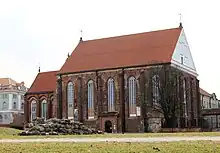Church of St. George the Martyr, Kaunas
St. George the Martyr Church, Kaunas (Lithuanian: Kauno Šv. Jurgio Kankinio bažnyčia) is a Roman Catholic church in the Old Town of Kaunas, Lithuania, which stands in front of the Kaunas Castle.[1][2][3] It is a prominent example of Gothic architecture in Lithuania.[1]
| St. George the Martyr Church Kauno Šv. Jurgio Kankinio bažnyčia | |
|---|---|
 St. George the Martyr Church | |
| Religion | |
| Affiliation | Roman Catholic |
| District | Old Town |
| Year consecrated | 1471 |
| Location | |
| Location | Kaunas |
| Country | Lithuania |
| Geographic coordinates | 54°53′53.75″N 23°53′1.45″E |
| Architecture | |
| Type | Church |
| Style | Late Gothic and Brick Gothic |
| Completed | 1487 |
| Materials | clay bricks |
| Website | |
| Jurgine.eu | |
History
Its history began in 1471 when Stanislovas Sendzivojevičius, the Court Marshall of the Grand Duchy of Lithuania, donated a plot of land on the outskirts of Kaunas and Ivaška Viaževičius, the Elder of Kaunas, agreed to fund the building of a wooden church and an adjacent monastery for the Bernardine monks.[2][1] Two decades later it was decided to re-build the church and the monastery in a Brick Gothic style.[1][2] The construction began in 1492 and ended in 1502.[1]
It was built roughly at the same time as the St. Anne's Church and the Bernardine churches in Vilnius and at the time of construction was second by ranking Bernardines (Franciscans) ensemble in Lithuania after Vilnius' ensemble.[1] All three churches were most likely built by the same famed architect from Danzig, Michael Enkinger.[1]
The church was heavily damaged during the Napoleonic Wars and most recently during the occupation of the Baltic states when the church was converted into a medicine warehouse.[2]
References
- ""Žvilgsnis į Lietuvą" - pažintis su Šv. Jurgio Kankinio bažnyčia ir Kauno bernardinų vienuolynu". Kpd.lt (in Lithuanian). Retrieved 24 September 2023.
- "Kauno Šv. Jurgio Kankinio bažnyčia ir bernardinų vienuolyno istorija". Architektūros ir urbanistikos tyrimų centras (in Lithuanian). Retrieved 2 November 2017.
- "Kauno Šv. Jurgio Kankinio (pranciškonų) bažnyčia". Kaunoarkivyskupija.lt (in Lithuanian). Retrieved 24 September 2023.